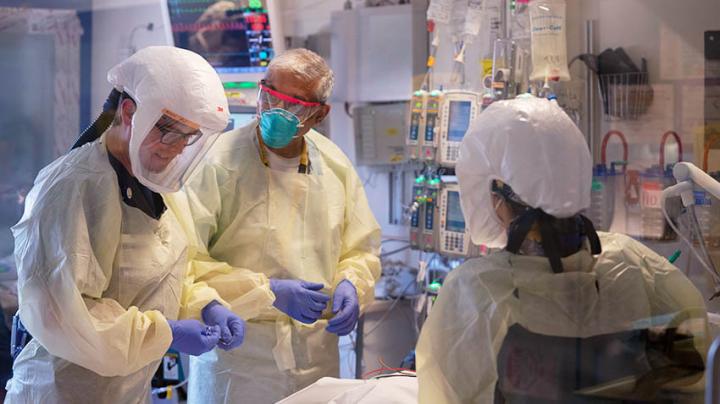Death, rehospitalization, and problems with basic activities, jobs, mental health and finances seen in many patients treated at 38 Michigan hospitals

Credit: University of Michigan
Surviving a case of COVID-19 that’s bad enough to land you in the hospital is hard enough. But life after the hospital stay – and especially after an intensive care stay – is no bed of roses, either, according to a new study.
Within two months of leaving the hospital, nearly 7% of the patients had died, including more than 10% of the patients treated in an ICU. Fifteen percent had ended up back in the hospital. The data come from more than 1,250 patients treated in 38 hospitals across Michigan this spring and summer, when the state was one of the earliest to experience a peak in cases.
When researchers interviewed 488 of the surviving patients by phone around 60 days after their hospitalization, they heard a litany of health and life woes. They’ve published their findings in the Annals of Internal Medicine.
“These data suggest that the burden of COVID-19 extends far beyond the hospital and far beyond health,” says Vineet Chopra, M.D., M.Sc., lead author of the study and chief of hospital medicine at Michigan Medicine, the University of Michigan’s academic medical center. “The mental, financial and physical tolls of this disease among survivors appear substantial.”
Lasting effects
More than 39% of the patients interviewed said they hadn’t gotten back to normal activities yet, two months after leaving the hospital. Twelve percent of the patients said they couldn’t carry out basic care for themselves anymore, or as well as before.
Nearly 23% said they became short of breath just climbing a flight of stairs. One-third had ongoing COVID-like symptoms, including many who still had problems with taste or smell.
Of those who had jobs before their bout with COVID-19, 40% said they couldn’t return to work, most because of their health and some because they’d lost their job. And 26% of those who had gone back to work said they had to work fewer hours or have reduced duties because of their health.
Nearly half of those interviewed said they’d been emotionally affected by their experience with COVID-19 – including a minority who said they’d sought mental health care.
More than a third – 37% — of those interviewed said their experience with COVID-19 had left them with at least a minor financial impact. Nearly 10% said they’d used up most or all of their savings, and 7% said they were rationing food, heat, housing or medications because of cost.
“The sheer number of people struggling after COVID brings new urgency to developing programs to better promote and support recovery after acute illness,” says Hallie Prescott, M.D., M.Sc., senior author and pulmonary/critical care physician at University of Michigan and the VA Ann Arbor Healthcare System.
More about the study
The study used date from the MI-COVID19 initiative, which rapidly evolved in April as a way for Michigan hospitals to pool and analyze data on their COVID-19 patients.
It grew out of existing multi-hospital quality improvement efforts funded by Blue Cross Blue Shield of Michigan, and drew on existing staff who are experienced at analyzing medical records and interviewing patients. That gave researchers a head start on studying COVID-19 patients treated in most of the hospitals that received such patients in the early-peak state of Michigan.
Details obtained from patient medical records, and in-depth interviews conducted after attempting to contact patients by phone multiple times, give a picture of what life is like for post-COVID patients.
Nearly 52% of the patients in the study are Black, and 4% are Hispanic. The average age is 62, and 83% lived at home before being hospitalized for COVID-19.
More than 14% had no chronic conditions before COVID-19 landed them in the hospital, and for many others the only condition they had was high blood pressure. The well-known risk factors of diabetes, cardiovascular disease and kidney disease were present in about a quarter of patients.
While hospital care for COVID-19 patients has improved since the early months of the pandemic, the study shows that the 63% of patients who were ever treated in an ICU had died during their hospital stay or within two months of leaving the hospital. That’s more than twice the rate for patients hospitalized but not admitted to an ICU.
###
Chopra worked on the study with senior author Hallie Prescott, M.D., a critical care physician and researcher at U-M and the VA Ann Arbor Healthcare System, as well as co-authors Scott Flanders, M.D., M.Sc., a hospitalist and chief clinical strategy officer for Michigan Medicine, statistician Megan O’Malley, Ph.D. and Anurag Malani, M.D., an infectious disease physician at St. Joseph Mercy Health in Ypsilanti, Michigan.
Chopra, Prescott and Flanders are members of the U-M Institute for Healthcare Policy and Innovation.
Media Contact
Kara Gavin
[email protected]
Related Journal Article
http://dx.




